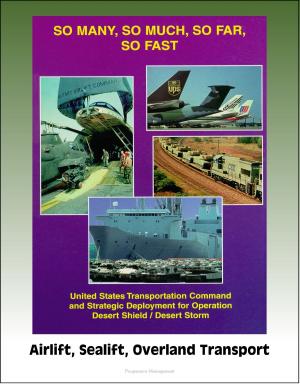Lt. General Ned Almond, U.S. Army: A Ground Commander's Conflicting View with Airmen over CAS Doctrine and Employment - Close Air Support in World War I, II, Korean War, Command and Control
Nonfiction, History, Military, Aviation, World War II| Author: | Progressive Management | ISBN: | 9781370381807 |
| Publisher: | Progressive Management | Publication: | September 25, 2016 |
| Imprint: | Smashwords Edition | Language: | English |
| Author: | Progressive Management |
| ISBN: | 9781370381807 |
| Publisher: | Progressive Management |
| Publication: | September 25, 2016 |
| Imprint: | Smashwords Edition |
| Language: | English |
This important report has been professionally converted for accurate flowing-text e-book format reproduction. This study analyzes the historical debate between the United States Army (USA) and United States Air Force over the issue of close air support (CAS). Specifically, this study examines four CAS subissues from World War I through the Korean War: priorities in the employment of airpower, the ownership and apportionment of CAS assets, the most effective CAS command and control (C2) system, and the debate over whether to procure a single or multipurpose CAS aircraft. A fundamental explanation given for Army and Air Force differences in philosophy on CAS is the historical difference in military objectives (decisive points). This difference has shaped air force, force structure and air asset employment, and significantly contributed to the Army-Air Force CAS debate.
The case study herein analyzes the CAS philosophy of Lt Gen Edward Mallory Almond, USA. The author reasoned that General Almond's diverse background in Army, Navy, and Air Force theory and employment would make him a logical candidate for a study. The main focus is on CAS employment and issues during the Korean War. General Almond served in the two world wars and commanded the X Corps during the Korean War. His personal papers stored at the US Army Military History Institute, Carlisle Barracks, Pennsylvania, offer unique insights into a ground commander's views on CAS.
While his opinions are much more complex than this abstract can do justice to, General Almond's CAS thoughts evolved to the following: (1) Air priorities should first be, air superiority, CAS second, and then interdiction and strategic attack; (2) The Army should maintain operational control of sufficient (meaning "lots of") CAS air assets and practice decentralized control (down to the division or corps level); (3) The services should build and adequately staff joint, well-integrated CAS C2 systems to support the CAS mission, and (4) The Air Force should build, with Army inputs, a single purpose CAS aircraft. While readers may or may not agree with all of General Almond's ideas, they will find good points of discussion. The general's thoughts on CAS C2 systems are of particular note and importance to today's military. The author closes by reiterating the principal issues, relevant findings and conclusions, and the implications of his analysis on current issues.
This important report has been professionally converted for accurate flowing-text e-book format reproduction. This study analyzes the historical debate between the United States Army (USA) and United States Air Force over the issue of close air support (CAS). Specifically, this study examines four CAS subissues from World War I through the Korean War: priorities in the employment of airpower, the ownership and apportionment of CAS assets, the most effective CAS command and control (C2) system, and the debate over whether to procure a single or multipurpose CAS aircraft. A fundamental explanation given for Army and Air Force differences in philosophy on CAS is the historical difference in military objectives (decisive points). This difference has shaped air force, force structure and air asset employment, and significantly contributed to the Army-Air Force CAS debate.
The case study herein analyzes the CAS philosophy of Lt Gen Edward Mallory Almond, USA. The author reasoned that General Almond's diverse background in Army, Navy, and Air Force theory and employment would make him a logical candidate for a study. The main focus is on CAS employment and issues during the Korean War. General Almond served in the two world wars and commanded the X Corps during the Korean War. His personal papers stored at the US Army Military History Institute, Carlisle Barracks, Pennsylvania, offer unique insights into a ground commander's views on CAS.
While his opinions are much more complex than this abstract can do justice to, General Almond's CAS thoughts evolved to the following: (1) Air priorities should first be, air superiority, CAS second, and then interdiction and strategic attack; (2) The Army should maintain operational control of sufficient (meaning "lots of") CAS air assets and practice decentralized control (down to the division or corps level); (3) The services should build and adequately staff joint, well-integrated CAS C2 systems to support the CAS mission, and (4) The Air Force should build, with Army inputs, a single purpose CAS aircraft. While readers may or may not agree with all of General Almond's ideas, they will find good points of discussion. The general's thoughts on CAS C2 systems are of particular note and importance to today's military. The author closes by reiterating the principal issues, relevant findings and conclusions, and the implications of his analysis on current issues.















